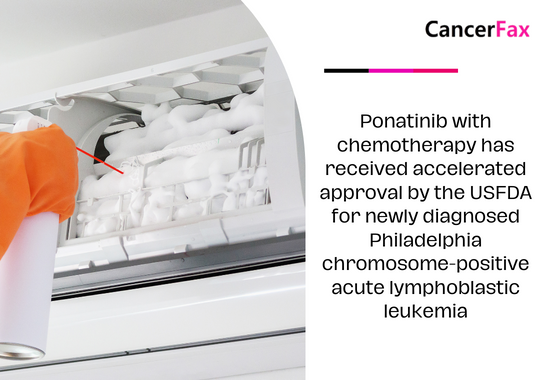March 2024: Ponatinib (Iclusig, Takeda Pharmaceuticals U.S.A., Inc.) has received fast approval from the Food and Drug Administration for use in combination with chemotherapy in adult patients who have recently been diagnosed with Philadelphia chromosome-positive acute lymphoblastic leukemia (Ph+ ALL).
The effectiveness of the treatment was assessed in a clinical trial called PhALLCON (NCT03589326). This experiment involved 245 adult patients who were newly diagnosed with Philadelphia chromosome-positive acute lymphoblastic leukemia (Ph+ ALL). The trial was randomized, meaning patients were assigned to different treatment groups, and it was active-controlled, meaning it compared the new treatment to an existing treatment. The trial took place at many centers and was open-label, meaning both the patients and the researchers knew which treatment each patient was receiving. Subjects were randomly assigned (2:1) to receive either ponatinib 30 mg orally once daily or imatinib 600 mg orally once daily in combination with chemotherapy (the use of imatinib with chemotherapy is not allowed). The chemotherapy treatment regimen included 3 rounds of induction therapy using vincristine and dexamethasone, followed by 6 rounds of consolidation therapy alternating between methotrexate and cytarabine, and finally 11 rounds of maintenance therapy using vincristine and prednisone. After the induction phase and achieving minimal residual disease (MRD)-negative complete remission (CR), the dosage of ponatinib was decreased to 15 mg once daily.
The effectiveness was determined by the rate of complete remission (CR) without minimal residual disease (MRD) at the conclusion of the induction phase. The rate of achieving complete remission (CR) without minimal residual disease (MRD) at the conclusion of the induction phase was 30% in the group treated with ponatinib and 12% in the group treated with imatinib. The risk difference between the two groups was 0.18 (95% confidence interval: 0.08, 0.28), with a p-value of 0.0004.
The predominant adverse effects observed were hepatic dysfunction, arthralgia, rash and related conditions, headache, pyrexia, abdominal pain, constipation, fatigue, nausea, oral mucositis, hypertension, pancreatitis/elevated lipase, peripheral neuropathy, hemorrhage, febrile neutropenia, fluid retention and edema, vomiting, paresthesia, and cardiac arrhythmias.
The suggested dosage for ponatinib is 30 mg administered orally once per day, with a reduction to 15 mg administered orally once per day after MRD-negative CR is achieved at the end of the induction period. Continue administering ponatinib in conjunction with chemotherapy for a maximum of 20 cycles, unless there is a loss of response or the presence of intolerable toxicity. To obtain information on the dosage agents used in conjunction with ponatinib, please refer to the prescribed information.


